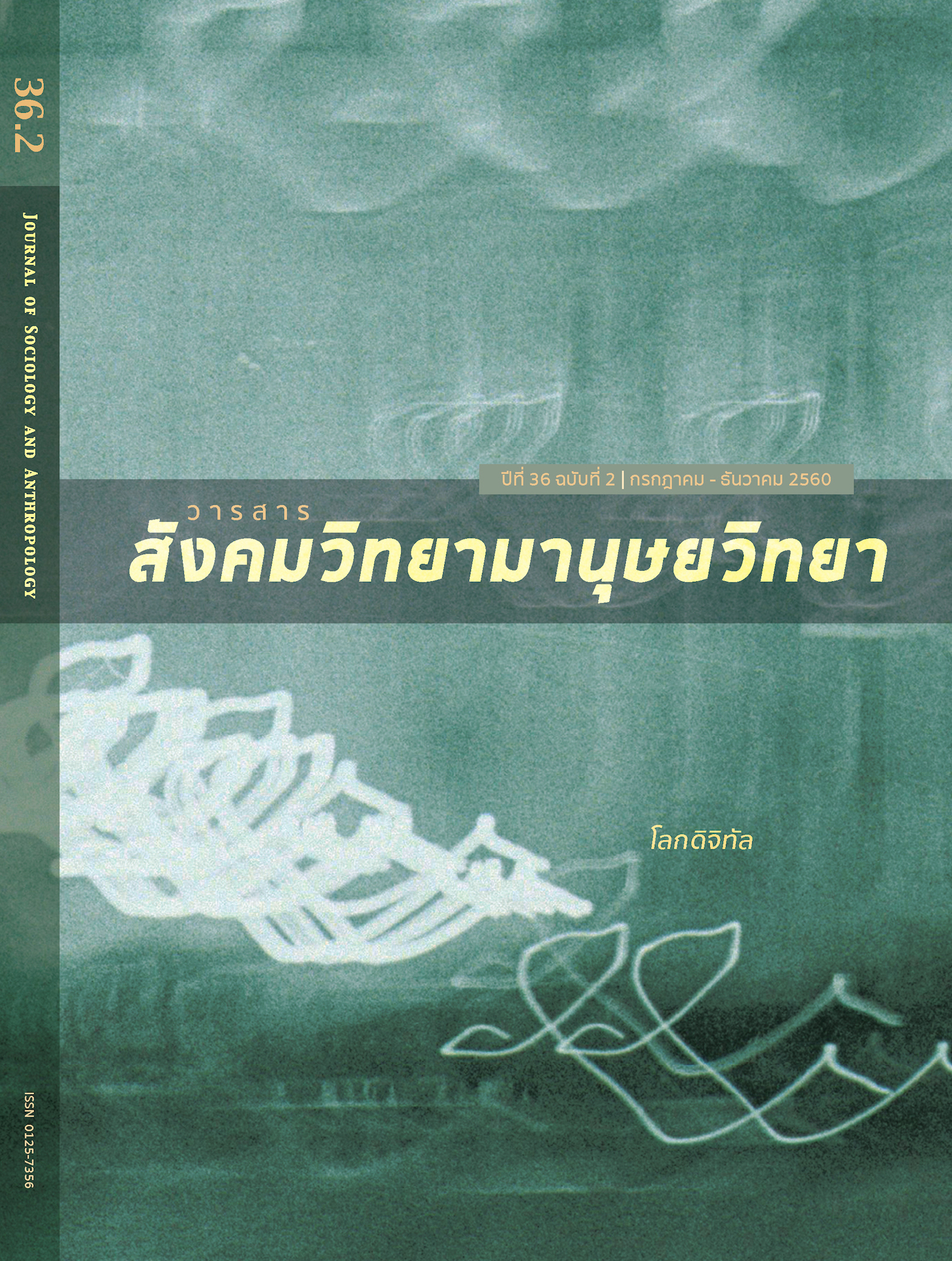collective identity of “page-nongng” as queer epistemology
Keywords:
collective identity, queer epistemology, Page-Nongng, sexualityAbstract
This article considers “Page-Nong” / “Page-Nongng”, a Facebook page well known for its comical, nonsense, vulgar, and politically incorrect messages, as a form of “queer epistemology”. The discussion focuses on three main components of the collective identity among those who “like” the Page: 1) the representation of “Satsana-Nongng” (Nongng religion) and its challenge to institutionalised Buddhism in contemporary Thai society; 2) the use of “Pasa-Thip” (divine language) against conventional writing and orthography of Thai language; and 3) the “Phua-Page” (husband of the Page’s admin and likers), an example of male objectification which poses questions to cultural bias against queer culture. Finally, the author proposes that, by employing queer theory to explain social relations embedded in these three main components might as well exemplify a challenging task to Thai academic tradition.
References
ชวิตรา ตันติมาลา. 2556. “‘ภ๊ษ๊สก๊อยป์’ (ภาษาสก๊อย): วัฒนธรรมอุบัติการณ์.” วารสารสถาบันวัฒนธรรมและศิลปะ (สาขามนุษยศาสตร์และสังคมศาสตร์) มหาวิทยาลัยศรีนครินทรวิโรฒ 14(28): 122-131.
ติณณภพจ์ สินสมบูรณ์ทอง. (2557). “การเมืองเรื่องคน (ที่ถูกทำให้) ไม่ธรรมดา: มองความเป็นหญิงของนางสาวยิ่งลักษณ์ ชินวัตร ผ่านกรอบเควียร์.” วารสารสังคมศาสตร์
44(2): 71-90.
ราชบัณฑิตยสถาน. 2553. พจนานุกรมคำใหม่ เล่ม 1. พิมพ์ครั้งที่ 2. กรุงเทพฯ: ธนาเพรส.
วิสุทธิ์ เหล็กสมบูรณ์. 2546. “การเขียนงานทางมานุษยวิทยากับการศึกษา ‘ความเป็นจริงทางสังคม’: มุมมองจากสตรีนิยม.” ใน ทะลุกรอบคิดของทฤษฎี, บรรณาธิการโดย อานันท์ กาญจนพันธุ์. กรุงเทพฯ: ศูนย์มานุษยวิทยาสิรินธร (องค์การมหาชน).
สุภางค์ จันทวานิช. 2552. ทฤษฎีสังคมวิทยา. กรุงเทพฯ: สำนักพิมพ์แห่งจุฬาลงกรณ์มหาวิทยาลัย.
อภิญญา เฟื่องฟูสกุล. 2546. อัตลักษณ์: การทบทวนทฤษฎีและกรอบแนวคิด. กรุงเทพฯ: คณะกรรมการสภาวิจัยแห่งชาติ สาขาสังคมวิทยา สำนักงานคณะกรรมการวิจัยแห่งชาติ.
เอกสารภาษาอังกฤษ
Adorno, Theodor W. and Max Horkheimer. 1979. Dialectic of Enlightenment. London: Verso.
Butler, Judith. 1993. “Critically Queer.” GLQ: A journal of lesbian and gay studies
1(1): 17-32.
Cameron, Deborah and Don Kulick. 2003. Language and Sexuality. Cambridge: Cambridge University Press.
Dittmer, Jason. 2010. Popular Culture, Geopolitics, and Identity. Lanham, Maryland: Rowman & Littlefield Publishers.
Eng, David L., Judith Halberstam, and José Esteban Muñoz. 2005. “Introduction: What’s queer about queer studies now?” Social Text 84-85/23(3-4): 1-17.
Fuss, Diana. 1990. Essentially Speaking: Feminism, nature and difference. London: Routledge.
Grbich, Carol. 2004. New Approaches in Social Research. London, Thousand Oaks, New Delhi: Sage.
Hall, Stuart. 1996. “Introduction: Who needs ‘identity’?” In Questions of Cultural Identity, edited by Stuart Hall and Paul du Gay. London, Thousand Oaks, New Delhi: Sage.
Kiley, Dean. 1998. “Queer Crash Test Dummies: Theory, aging, and embodied problematics.” In Looking Queer: Body image and identity in lesbian, bisexual, gay and transgender communities, edited by Dawn Atkins. New York: The Haworth Press, Inc.
Read, Kenneth. 1980. Other Voices: The style of a male homosexual tavern. Novato, California: Chandler and Sharp Publishers, Inc.
Seidman, Steven. 1993. “Identity and Politics in a ‘Postmodern’ Gay Culture: Some historical and conceptual notes.” In Fear of a Queer Planet: Queer politics and social theory, edited by Michael Warner. Minneapolis: University of Minnesota Press.
Sinsomboonthong, Tinnaphop. 2017. “Politics of ‘Page-Nongng’, Politics of Nonsense: De-formalisation, subaltern space, collective identity.” Paper presented at the 13th International Conference on Thai Studies, Chiang Mai, July 15-18, 2017.
Spargo, Tamsin. 1999. Foucault and Queer Theory (Postmodern Encounters). Cambridge: Icon Books.
Spracklen, Karl. 2015. Digital Leisure, the Internet and Popular Culture: Communities and identities in a digital age. New York: Palgrave Mcmillan.
Westwood, Gordon. 1952. Society and the Homosexual. London: Victor Gollancz.
Wood, Mitchell J. 2004. “The Gay Male Gaze: Body image disturbance and gender oppression among gay men.” Journal of Gay & Lesbian Social Services 17(2): 43-62.
Wray, Tim. 2003. “The Queer Gaze.” Thesis, Wissenschaftliche Zeitschrift der Bauhaus-Universität Weimar (4): 68-72.
เอกสารออนไลน์
นฤพนธ์ ด้วงวิเศษ. 2558. “เควียร์กับการวิพากษ์มานุษยวิทยากระแสหลัก.” ฐานข้อมูลศัพท์มานุษยวิทยา ศูนย์มานุษยวิทยาสิริธร, 15 มิถุนายน. http://www.sac.or.th/databases/anthropology-concepts/articles/1. สืบค้นวันที่ 1 ตุลาคม 2560
Prism Digital Magazine. 2560. “Prism ดิจิตอล แมกกาซีน | ISSUE 15 : Transsex & The City ‘พาสาทิพย์ - ภาษาน้องง’.” YouTube video, 3:43. 28 กุมภาพันธ์. https://youtu.be/JEHCtsZjt7g. สืบค้นวันที่ 1 ตุลาคม 2560.



